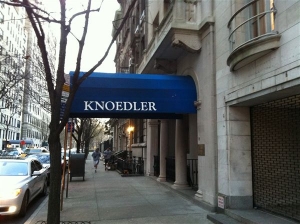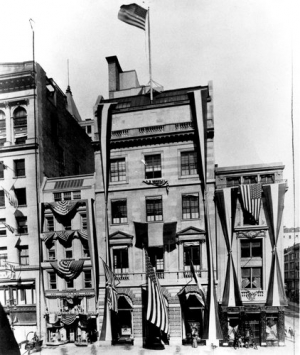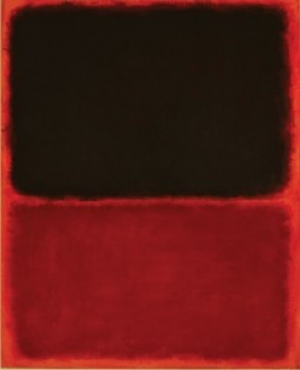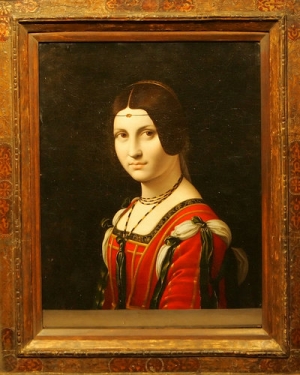|
Displaying items by tag: Ann Freedman
US judge Paul Gardephe is considering nearly two dozen motions of enormous consequence for the first trial in the $60m Knoedler Gallery forgery scandal scheduled to begin on 25 January. The motions concern what evidence the jury will hear, and so will help influence their verdict on whether the defendants—the gallery, its former director Ann Freedman, and its owner 8-31 Holdings—should pay the collectors Domenico and Eleanore De Sole up to $25.3m for selling the couple a fake Mark Rothko painting in 2004.
With a trial looming, the Knoedler Gallery, its former director Ann Freedman, and Knoedler’s owner 8-31 Holdings have reached a settlement with the New York collector John Howard. Howard had bought a fake work by Willem de Kooning from the gallery for $4m. The lawsuit arose from Knoedler’s selling some $60m of fake Abstract Expressionist art in a scandal that sent shivers through the art world when it broke in late 2011.
In a forgery scandal that shook the art world, the now-shuttered Knoedler Gallery and its former director Ann Freedman will have to go to trial in two cases involving the sale of fake Abstract Expressionist paintings, Manhattan’s federal court ruled on Wednesday, 30 September.
In his three-page order, Judge Gardephe denied the gallery’s and Freedman’s motions for summary judgment in the lawsuits brought by the New York collector John Howard and Sotheby’s chairman Domenico De Sole and his wife, Eleanore.
In what has been termed a “document dump”, previously undisclosed information and inflammatory allegations in two of the Knoedler gallery art-forgery lawsuits are now public for the first time. Last Wednesday, Knoedler, its former director Ann Freedman, the head of a related holding company Michael Hammer, and a former employee Jaime Andrade filed motions seeking to dismiss the lawsuits. The next day, the collectors Eleanore and Domenico De Sole and John Howard struck back, arguing that their cases must go to trial and accusing Freedman of perjury “on multiple occasions, including before this court”, a charge she vigorously denies.
More than 500 pages of legal arguments and thousands of pages of exhibits are now before Manhattan’s federal court.

Ann Freedman, former president of the disgraced gallery Knoedler & Co., filed a defamation suit on Wednesday, September 11 in New York State Supreme Court. Freedman helmed the historic gallery until it closed in 2011 amidst charges that it had sold forged artworks worth nearly $80 million.
In her case, Freedman declared that she did due diligence in researching a collection that was presented to her and listed nearly 20 experts, including curators from the Museum of Modern Art, the National Gallery of Art and the Solomon R. Guggenheim Museum, that told her that the works were authentic. However, in many of these cases, the comments were unofficial and decidedly vague.
Freedman’s case is aimed at Manhattan art dealer Marco Grassi who was quoted in a New York magazine as saying “A gallery person has an absolute responsibility to do due diligence, and I don’t think she did it. The story of the paintings is so totally kooky. I mean, really. It was a great story and she just said, ‘this is great.’”
Long Island-based art dealer Glafira Rosales and her boyfriend are allegedly responsible for selling the 60 forgeries to Knoedler & Co. The couple claimed that the works were authentic masterpieces by artists such as Jackson Pollock, Willem de Kooning and Mark Rothko. It was recently discovered that they were painted by an artist in his home studio in Queens.

165 years ago, the Knoedler Gallery opened its doors in New York and went on to help create some of the country’s most celebrated collections including those of Paul Mellon, Henry Clay Frick, and Robert Sterling Clark. Throughout the years, top-notch works by artists such as van Gogh, Manet, Winslow Homer, John Singer Sargent, Louise Bourgeois, and Willem de Kooning passed through the gallery. When the Soviet government sold hundreds of paintings from the State Hermitage Museum in Leningrad in the 1930s, they chose to work with Knoedler to sell paintings by masters like Rembrandt, Raphael, and Velazquez.
Knoedler’s exemplary past is often forgotten as the gallery’s present has been mired in lawsuits and accusations that the company’s former president, Ann Freedman, was in the business of selling fakes. Last year, Knoedler Gallery closed its doors for good.
This week, Los Angeles’ Getty Research Institute announced that it had bought the Knoedler Gallery archive. Spanning from around 1850 to 1971, the archive includes stock books, sales books, a photo archive and files of correspondence, including letters from artists and collectors, some with illustrations. The Getty was interested in Knoedler’s archive because it offers an expansive glimpse into the history of collecting and the art market in the United States and Europe from the mid-19th century to modern times.
The archive was purchased from Knoedler’s owner, Michael Hammer, for an undisclosed amount. Meticulously preserved, the archive will be available to scholars and digitized for online research after the Getty catalogues and conserves it all.

Domenico De Sole, chairman of the fashion powerhouse, Tom Ford International, is suing Michael Hammer, chairman of the disgraced Knoedler Gallery. De Sole and his wife, Eleanore, claim that Hammer sold the couple a fake Mark Rothko (1903–1970) painting (Untitled, 1956) for $8.3 million back in 2004. The allegation against Hammer is an amendment to a lawsuit that was originally filed against Knoedler on March 28.
De Sole’s suit is one of three against Knoedler and its former director, Ann Freedman. The suits all claim that Knoedler Gallery knowingly sold counterfeits. Between the three cases, the plaintiffs are seeking more than $70 million in damages.
Knoedler closed on November 30, 2011 after 165 years in the art world. A claim that the gallery sold a fake Jackson Pollack (1912–1956) painting for $17 million was the reason for Knoedler’s abrupt departure.
In addition to Hammer, the De Sole suit has introduced three new defendants to the ongoing Rothko/Knoedler case. Glafira Rosales, a Long Island art dealer who consigned artworks to Knoedler is newly involved as is as Jaime Andrade, a former Knoedler employee who introduced Rosales to the gallery. Jose Carlos Bergantinos Diaz, Rosales companion and business partner has also been added to the suit.
When Knoedler sold Untitled, 1956 to the De Soles, Freedman claimed that a Swiss collector had bought it directly from Rothko, and after the collector’s death, Knoedler was responsible for selling the work on his son’s behalf. The gallery had bought the painting from Rosales a year earlier for $950,000 and relied on her work about the painting’s provenance. Suspicions arose after Knoedler Gallery closed amidst the Pollack scandal and the De Soles’ lawyers hire a forensic conservator who found the painting’s marks and composition were inconsistent with Rothko’s technique.

Federal District Court Judge Paul G. Gardephe’s résumé includes many impressive accomplishments but not an art history degree. Nonetheless he has been asked to answer a question on which even pre-eminent art experts cannot agree: Are three reputed masterworks of Modernism genuine or fake.
Judge Gardephe’s situation is not unique. Although there are no statistics on whether such cases are increasing, lawyers agree that as art prices rise, so does the temptation to turn to the courts to settle disputes over authenticity. One result is that judges and juries with no background in art can frequently be asked to arbitrate among experts who have devoted their lives to parsing a brush stroke.
The three cases on Judge Gardephe’s docket in Manhattan were brought by patrons of the now-defunct Knoedler & Company who charge that the Upper East Side gallery and its former president Ann Freedman duped them into spending millions of dollars on forgeries.
The judge’s rulings may ultimately rely more on the intricacies of contract law than on determinations of authenticity. But the defendants and plaintiffs are busily assembling impressive rosters of artistic and forensic experts who hope to convince the judge that the works — purportedly by Jackson Pollock, Willem de Kooning and Mark Rothko — are clearly originals or obvious fakes.
Of course judges and juries routinely decide between competing experts. As Ronald D. Spencer, an art law specialist, put it, “A judge will rule on medical malpractice even if he doesn’t know how to take out a gallstone.” When it comes to questions of authenticity, however, lawyers note that the courts and the art world weigh evidence differently.
Judges and juries have been thrust into the role of courtroom connoisseur. Legal experts say that, in general, litigants seek a ruling from the bench when the arguments primarily concern matters of law; juries are more apt to be requested when facts are in dispute.
|
|
|
|
|